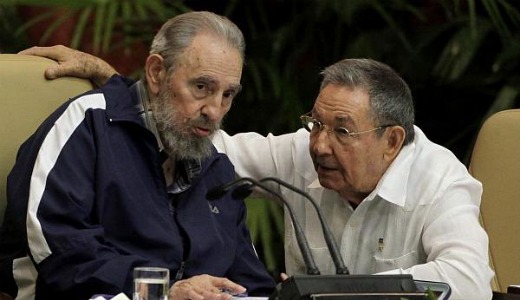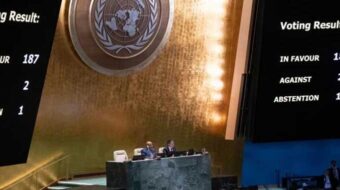
The sixth congress of the Communist Party of Cuba wound up on April 19 with the election of a new leadership for the party and a set of proposals to be submitted to the National Assembly of People’s Power, Cuba’s legislature, for approval.
Party leaders stressed that even though some of the proposals may seem radical, their purpose is not to dismantle, but to strengthen Cuba’s socialist system.
The present Communist Party of Cuba is the result of the coming together, after the Cuban Revolution of January 1 1959, of the communist People’s Socialist Party, Fidel Castro’s 26 of July Movement and others.
It has a history of innovativeness and adaptability, combined with a firm commitment to socialism. It also has a remarkable record of international solidarity, and continues to make major contributions to Marxist theory.
The Party has nearly 800,000 members in this nation of 11 million. There were 1,000 delegates to the congress. To prepare for the it, there were 163,000 discussion meetings, based on a set of guidelines or proposals, in workplaces and the community over the last several months, with nearly 9 million Cuban citizens participating and proposing changes to the draft proposals. In other words, not only party members but the whole of Cuban society participated in these consultations, which resulted in a significant evolution of the original proposals.
President Raul Castro, in his address to the congress, exemplified both the firmness and the adaptability of the Cuban communists. He strongly criticized some tendencies that had developed in the functioning of the party and state, which in his view sap the efficiency of economic institutions and need to be changed.
Among the most controversial proposals is to phase out the food ration book, which has been so all-encompassing that until recently it covered the purchase of cigarettes, at a time when Cuban health authorities have been trying to curb smoking. Also, the book provides for coffee rations for newborn babies, not big imbibers even in coffee-loving Cuba. The idea of phasing out the ration book at a time when food prices are rising worldwide has caused some worry, but President Castro said that nothing would be done precipitously; there will be consultation and adjustment of these plans as they are gradually implemented. “The Revolution will not leave any Cuban helpless. The social welfare system is being reorganized to ensure a rational and deferential support to those who really need it. Instead of massively subsidizing products as we do now, we shall gradually provide for those people lacking other support.”
The government has already begun laying off state workers while at the same time opening up opportunities for small businesses, cooperatives and self-employment in non-crucial areas of the economy. Over time, it is anticipated that over a million will be laid off. Government land had also been distributed to persons willing to try their hand at farming. The congress voted to ask the legislature to lower proposed taxes on these “micro-enterprises,” and called for phasing out the current “dual currency” system, devolution of some central state powers to local governments and a looser central control over state economic enterprises.
Many Cubans will be happy to hear that the congress recommended making it easier to sell one’s house or automobile. Castro stressed that by rationalizing all these things, the state will be able to focus its resources better and, thus, socialism will be strengthened.
Raúl Castro proposed a radical change in the way that the party relates to the government. He believes that these functions have become muddled leading to a difficulty in decision making in both entities. He called for the Communist Party to withdraw from involvement in the running of state entities, and to concentrate on its role as educator and moral conscience of the Cuban nation. At the same time, he recommended that elected state officials be limited to two five-year terms, to stimulate the advancement of younger people.
Castro reiterated Cuba’s willingness to talk to the United States without preconditions, but deplored the fact that the U.S. has intensified enforcement of some aspects of the trade blockade it has maintained against Cuba for more than 50 years.
The party leadership elected by the Congress contains a mixture of old and new. The new 15-member Political Bureau, the highest ongoing body of the Party, is notable for an absence: Former President Fidel Castro, who attended the Congress, no longer is listed. He has explained that when he fell dangerously ill from an intestinal ailment in 2006, he withdrew from both government and party posts. Raúl Castro now moves into Fidel’s old position of First Secretary. Veteran revolutionary Jose Ramon Machado Ventura is the Second Secretary, while the rest of the membership includes well known figures such as Vice President Ramiro Valdez Menendez, Vice President Esteban Lazo Hernandez, parliament President Ricardo Alarcon de Quesada, Cuban Confederation of Workers secretary general Salvador Valdez Mesa and Havana Province party leader Mercedes Lopez Acea.
The 7-member secretariat and the other 95 Central Committee members included a wide array of interests and activities in Cuban society, with a strong representation of women. The 115-member Central Committee is composed of 48 percent women, 31 percent Afro-Cubans and people of mixed race, and many younger people. They represent a wide array of interests and activities in Cuban society, including agriculture, industry, sports, foreign affairs, science, health care, academia, environmentalism and other fields.
Image: Fidel and Raúl Castro confer at the recent congress of the Cuban Communist Party, via Associated Press.












Comments